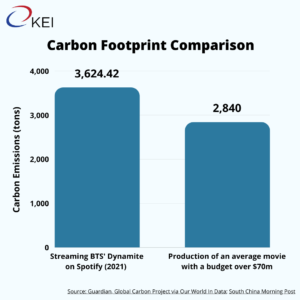The Peninsula
Limitations on K-Pop’s Commitment to Sustainability
Published June 19, 2022
Author: Kaitlyn King, Korea View
Category: Current Events, South Korea, Culture

Last year, pop idols Blackpink were designated as promotional ambassadors for the UN Climate Change Conference. The group has continued its advocacy this year, delivering new calls for environmental awareness and rallying fans around environmental activism. Other K-pop bands and their fans also promote social causes – particularly environmental protection. However, the music industry’s current business model nullifies gains from these efforts.

K-pop groups and their fans have made real strides in promoting environmental protection and sustainability. Artists like Chungha produce their albums using recycled materials and singer Chuu runs a YouTube channel that promotes environmental sustainability with over one million subscribers. Fans of the K-pop group BTS have come together to plant forests and fans in Indonesia built a platform to rally people in the community to engage in climate change activism.
Nonetheless, the current business model of the industry actively works against these efforts. For instance, entertainment companies publish multiple versions of the same K-pop album, compelling fans to bulk-buy to complete their collections. This contributes to overproduction and higher waste. K-pop groups also rely heavily on music streaming through platforms such as Spotify to gain international popularity and industry recognition. Music streaming helps artists break records and win awards, but comes with an environmental cost – an hour of streaming has the same environmental impact as producing approximately 55 grams of CO2. These studios have also expressed interest in creating digital tokens, which create higher demand for computing power and exacerbate carbon emissions.
These behaviors suggest that both music companies and K-pop fans have not yet reconciled their stated principles with the impact they are having on the environment.
This briefing comes from Korea View, a weekly newsletter published by the Korea Economic Institute. Korea View aims to cover developments that reveal trends on the Korean Peninsula but receive little attention in the United States. If you would like to sign up, please find the online form here.
Korea View was edited by Yong Kwon with the help of Jae Chang, Kaitlyn King, Yu Na Choi, and Mai Anna Pressley. Picture from the flickr account of Travis Wise
